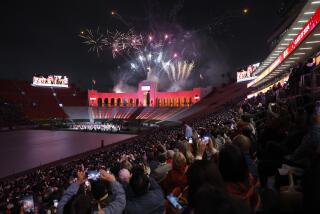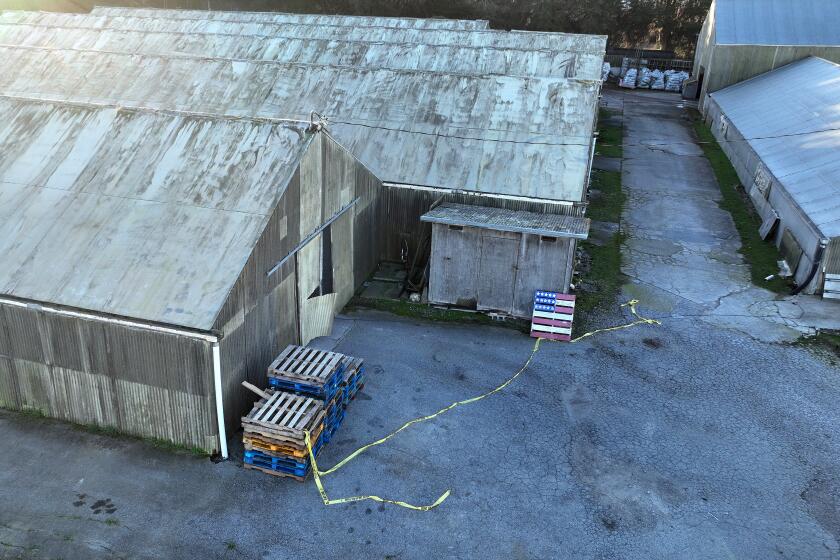Immigrant Soviet Jews Get First Taste of Their Religion in L.A.
As 7-year-old Zhana Rozeman ate the freshly baked challah, or Sabbath bread, her face lit up with delight.
The experience was part of her first real taste of religious freedom--an experience shared by many of the 300 youngsters attending the Chabad Russian Immigrant Program summer day camp in Hollywood this month.
“The main thing we do at camp is give the children a sense of identification,” said Rabbi Naftoli Estulin, the ebullient director. “They were afraid to show their nose in Russia. Now we make sure they know how to enjoy being a free Jew.”
Zhana and her parents are among thousands of Jewish families in the Los Angeles area who are recent emigres from the Soviet Union.
After the failed Soviet coup, thousands more may soon be able to practice their faith and travel, Estulin said.
“Now, the Jews will come out openly,” he said. “I hope, with God’s help, we will be very busy.” The Chabad Center, which helps to introduce them to customs and rituals they were forbidden to practice, is expecting a rush, Estulin said.
“We are now printing 10,000 prayer books in Russian,” he said. “It’s a big job to do it. But if it’s not enough, we will print more.”
Before the coup ended, the steady stream of immigration that began under glasnost was briefly in jeopardy as the dark shadow of authoritarianism passed over the Soviet Union, momentarily threatening the flow of exit visas.
“Thank God it didn’t happen!” exclaimed Berele Zaltzman, a rabbi and cantor who works with Estulin. The Chabad Russian center is in the heart of West Hollywood, the chief congregating spot for the estimated 25,000 to 60,000 Soviet Jews now living in Southern California.
In light of reforms begun since the failed coup, “there may well be requests for additional slots” for Soviet Jews to obtain exit visas, said Steven Windmueller, executive director of the Community Relations Committee of the Jewish Federation Council of Greater Los Angeles.
A large number of new emigres have become devout believers.
“Many had never been in a synagogue before,” said Jerry Friedman, a leader in the resettlement section of the Jewish Federation Council. “They’ve never seen any of the positive aspects of Judaism. We’re trying to make it a healthy, pleasant experience for them.”
“There is a Jewishness inside of us,” said Galina Barkhash, who has been in the United States less than three years. Afraid to attend synagogue in Russia, her family is now active at Temple Israel of Hollywood. One of the Barkhashes’ sons recently celebrated his bar mitzvah; the other is enrolled in Hebrew day school.
Barkhash said for her younger son, the school and synagogue “are like a second home. He wants to take more classes and visit Israel.”
To meet such awakening interest, Southland Jewish leaders conduct daily and High Holy Days activities--some in Russian--and provide a plethora of services for those who want to practice Judaism but don’t know how.
At the Chabad center, for example, 80 Russians are enrolled in daily English classes and morning services. About 500 seniors take classes in Hebrew and Jewish history and law.
One Sunday this month, a crowd of 800 jammed Congregation Beth Jacob in Beverly Hills to witness a group bar mitzvah for 20 recently arrived Russian youths who had not been allowed to celebrate the traditional Jewish rite of manhood in their native land.
After the young men had stepped forward to accept the Torah, the Jewish writings of tradition and law, the oldest, Leo Rudoy, 27, declared: “My real Jewish life is going to start now.”
And this afternoon, 20 Soviet immigrant couples--including Rudoy’s parents--will retake their vows in a full Jewish ceremony conducted by 20 Orthodox rabbis at the Westin Bonaventure Hotel.
“After 35 years of marriage I am finally doing it right . . . I feel like a young bride all over again,” exclaimed Roza Rudoy.
Such ceremonies are common for couples who exchanged civil vows in the Soviet Union but were denied the religious service, according to Dan Clarke. He is a lay leader at Temple Ramat Zion in Northridge, a Conservative congregation that also holds group weddings for Russian couples.
Circumcision, a rite usually marking religious identification for all Jewish boys on the eighth day after birth, is being performed on Soviet Jewish males of all ages. Estulin, himself a Soviet immigrant, said he oversees five or six adult circumcisions every week.
“These people coming out of Russia want to be Jews with all of their heart,” Estulin said. “And when American Jews see that kind of sacrifice, this is a push--a wake-up call”--to a more active religious life.
Shimon Raichik, rabbi at Chabad of Hancock Park, compared that effect on American Jews to “seeing somebody who is hungry, eating. It makes you want to eat, too.”
But Rabbi Norbert Weinberg of Hollywood Temple Beth El says Jews who have been out of touch with their religion--some for as long as 80 years--find reconnection to be a “complicated journey.”
“There is a great interest, a curiosity, and a great deal of admiration on the part of the new immigrants about what the Jewish community has created here,” he said. But formal membership in a synagogue “is an alien idea” to most recent Soviet Jewish emigres.
Weinberg thinks newcomers often don’t comprehend that “one becomes a devout Jew by gradual study and understanding. It requires knowledge and background. That is difficult to expect of the new immigrants.”
Miriam Prum Hess, refugee acculturation coordinator for the Jewish Federation Council, says Soviet Jewish emigres come to Southern California with “one of three Jewish connections”:
* About 70% regard the “J” on their passport--which means they are Jewish and thus were discriminated against in the Soviet Union--simply as a passage to America if they have a sponsor and make the quota.
* About 5%--mostly elderly--have recollections of their Jewishness harking back to pre-repression days.
* The rest are younger “Refuseniks” who were involved in the Jewish religious underground in the Soviet Union.
But Hess said that well over half of all Soviet Jewish emigres “want to learn about what the ‘J’ really means.”
Often, that involves religious services.
More than 1,000 who had been here less than one year participated in community Passover Seder meals for the first time last March. And for the Jewish New Year this September, area synagogues are donating thousands of admission tickets so new emigres can experience their first Rosh Hashanah and Yom Kippur services celebrated in freedom.
Maria Shvartz remembers coming to Los Angeles just before the High Holy Days several years ago. She attended a freedom Seder at the Stephen S. Wise Temple.
“It was like a beautiful dream to be all there as one big Jewish family,” she recalled. “I was mostly crying and praying. (In the Soviet Union) they didn’t allow Jews to come together, not so many at one time.”
More to Read
Start your day right
Sign up for Essential California for news, features and recommendations from the L.A. Times and beyond in your inbox six days a week.
You may occasionally receive promotional content from the Los Angeles Times.






